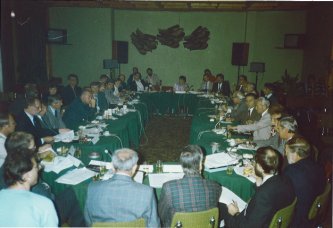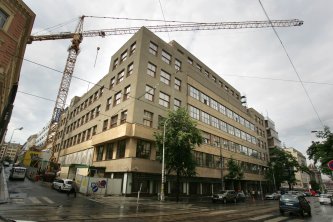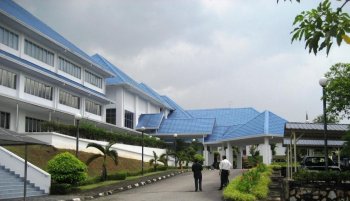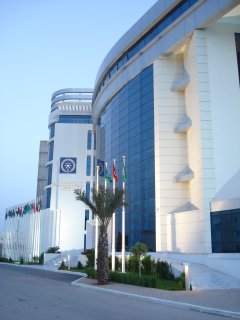Facts about HFCC & History
HFCC co-ordinates frequency channels used in short wave broadcasting. Its history started in 1990 when broadcasters, and also some representatives of administrations from both sides of the former Iron Curtain, met for the first time in Pamporovo, Bulgaria with the aim of establishing co-operation in that sphere.
The main objective of the HFCC is to provide the representation and services for the promotion of an efficient and economical use of the short-wave radio spectrum, and the improvement of radio reception of short-wave broadcast transmissions world-wide. The progressive reduction of short-wave transmitter powers, leading to savings in both transmitter and energy costs and a consequent limitation of the impact of high level electromagnetic fields on the world environment is another important objective of the HFCC.
HFCC's main activity is a direct co-ordination of frequencies among frequency managers and specialists of broadcasters, administrations, transmission service providers and other organisations with the aim to facilitate the resolution or minimisation of mutual interference on short waves. HFCC co-ordinates two schedules annually: The "A" schedule corresponds to the summer period on the Northern hemisphere and "B" to the winter period in keeping with the dates of the clock-time changes in Europe.
Membership of the HFCC is open to all individuals and organisations that provide frequency management and planning for recognised short wave broadcasters. Those wishing to attend are first invited as observers to a seasonal conference. Membership is extended to observers at the conclusion of the meeting.
HFCC is a legal entity registered as a civic association in the Czech Republic.
HFCC is a sector member of the International Telecommunication Union in Geneva in the category of international and regional organisations. In addition, the HFCC is registered as a regional co-ordination group with the ITU.
The HFCC started co-ordination with the aim of helping the International Telecommunication Union develop an effective system of frequency management for international shortwave broadcasting. All attempts to introduce planning in that part of the spectrum made through the decades since the discovery of shortwaves failed mainly because of ideological conflicts and overcrowding.
The ITU devoted full attention to the emerging co-ordination group and a special task group had been set up by the Radiocommuniation Assembly of the ITU in 1993 to study the co-ordination procedures developed in the HFCC. The task group completed its work in November 1996. The report concluded that: ".. co-ordination process used in HFCC has resulted in a significantly reduced number of incompatibilities. A pattern of frequency usage has evolved which only varies slowly with changes in propagation and programme requirements. This pattern of usage gives frequency continuity which is appreciated by the listeners and greatly simplifies the frequency solution and co-ordination processes." The task group of the ITU recommended further in 1996 that the procedures developed by the HFCC should become an integral part of the shortwave frequency management. The principles of co-ordination were incorporated into the International Radio Regulations during the 1997 World Radio Conference.
The new article in the International Radio Regulations anticipated the creation of several regional co-ordination groups but it did not define co-ordination procedures among them. The HFCC understood that shortwave co-ordination had to be global and it helped create a sister group in the Asia - Pacific region even before the new Article 12 was introduced into the Regulations. This new ABU-HFC group has been active since 1996, and it is closely associated with the headquarters of the Asia-Pacific Broadcasting Union in Kuala Lumpur. It started using software and procedures developed by the HFCC, and its members started submitting their frequency requirements into the global HFCC database. A representative of the ABU countries was later invited to the regular Steering Board meetings.
An important niche in the history of the HFCC was reached in 1998: Short wave broadcasters in member countries of the Arab States Broadcasting Union decided that they would join the co-ordination activities organised by the HFCC. Since then, the HFCC and ASBU have held joint conferences both before the "A" and "B" seasons, and two representatives of the ASBU countries have permanent seats on the Steering Board. In addition, joint face-to-face conferences of participants from all three groups including the Asia-Pacific region have been held from time to time. An agreement on holding regular "global" conferences annually always before the "A" season was reached in 2008.
Read also about Conferences and On-line Co-ordination >>
What's New
[16-Dec-2025] - The ITU-BR has published the Circular Letter CR/525 in application of Article 12 of the Radio Regulations
[8-Dec-2025] - A26 upload opened. Please review and confirm your contact details prior to uploading the initial version of your A26 data.
[7-Nov-2025] - A26 registration and hotel booking opened on the A26 Conference Webpage in the Member's Area
[9-Sep-2025] - Radio Prague International news coverage of B25 Global Conference in English, German, French, Russian, Ukrainian and Czech
[8-Sep-2025] - Two posts were recently added to the Equipment Supply & Demand section of the Forum in Members' Area
[3-Sep-2025] - Presentations and other documents added to the B25 Prague Conference Webpage in Member's Area
[26-Aug-2025] - Document containing proposed revisions to the WRC Resolutions and Recommendations. This will be an EBU input to the CEPT (European administrations) preparatory process for WRC-27 (to be introduced in the September 2025 meeting of CEPT, Project Team C). The proposals would be reviewed at WRC-27. Please provide feedback to Oliver Ings (BBC)
[16-Jun-2025] - B25 upload opened. Please review and confirm your contact details prior to uploading the initial version of your B25 data.
[24-Apr-2025] - Encompass Digital Media Ltd are adding additional IRDR broadcasts for Democratic Voice of Burma (DVB) 0100-0130 UTC on 9430 kHz & 1300-1330 UTC on 17500 kHz. All transmissions are operating daily from Dhabayya transmitting from 24th April for approximately 10-14 days, providing special programming to Myanmar in response to the earthquake.
[8-Apr-2025] - B25 registration and hotel booking opened on the B25 Conference Webpage in the Member's Area
[2-Apr-2025] - Encompass Digital Media Ltd are broadcasting Mizzima Media 0030-0100 UTC on 9430 kHz (daily) & 1230-1300 UTC on 17500 kHz (daily) from Dhabayya transmitting from 1st April for approximately 10 days, providing special programming to Myanmar in response to the earthquake.
[19-Feb-2025] - A25 GoE Report, A25 Coordinated Data snapshot. Deadline for A25 Operational Data upload: 10 March 2025
[20-Dec-2024] - The ITU-BR has published the Circular Letter CR/513 in the application of Article 12 of the Radio Regulations
[27-Nov-2024] - A25 upload opened. Please review and confirm your contact details prior to uploading the initial version of your A25 data.
[15-Oct-2024] - B24 plenary minutes
[26-Jun-2024] - Minutes of the May 2024 SB meeting
[7-Jun-2024] - B24 upload opened. Please review and confirm your contact details prior to uploading the initial version of your B24 data.
[29-May-2024] - Questionnaire on Capacitors - please respond by 15 July 2024. Please, kindly submit the simple form repeatedly for every capacitor type you use.
[26-Feb-2024] - A24 plenary minutes
[5-Feb-2024] - ITU-BR Circular Letter CR/501 containing closing dates for receipt of ITU HFBC A24 and B24 schedules, info on coordination meetings in 2024/2025, IRDR and the new eHFBC platform
[28-Dec-2023] - IMPORTANT: New requirement for foreign citizens entering Malaysia effective January 1, 2024
[11-Dec-2023] - A24 upload opened. Please review and confirm your contact details prior to uploading the initial version of your A24 data.
[13-Nov-2023] - A24 registration and hotel booking opened on the A24 Conference Webpage in the Member's Area
[13-Nov-2023] - eHFBC - new ITU online platform for HF broadcasting
[30-Oct-2023] - B23 GOE report
[20-Oct-2023] - B23 plenary minutes
[9-Oct-2023] - B23 operational data snapshot
[10-Aug-2023] - Follow up on the questionnaire on transmitter tubes and table by CPI
[8-Aug-2023] - B23 initial tentative data snapshot
[26-May-2023] - Encompass Digital Media Ltd are broadcasting Democratic Voice of Burma (DVOB) 1230-1300 UTC (daily) from Dhabayya utilising IRDR frequency 21840kHz transmitting from 29th May for approximately 1 month, providing special programming to Myanmar in response to the recent cyclone
[20-May-2023] - Sad news about Tom Lucey
[5-May-2023] - Summary of the questionnaire on transmitter tubes. The Questionnaire remains open for further responses
[5-May-2023] - Steps to apply for standard (non-ETA) visa added to the B23 webpage
[1-May-2023] - Encompass Digital Media Ltd are broadcasting Agricultural Voices Syria 0300-0330 UTC (weekdays) from Dhabayya utilising IRDR frequency 11840kHz transmitting from 24th April for 2 weeks of special programming educating farmers on how to grow and manage crops within the disaster zone
[9-Mar-2023] - Deadline for answering the Questionnaire on Transmitter Tubes has been extended
[1-Mar-2023] - A23 GOE report
[28-Feb-2023] - A23 plenary minutes




